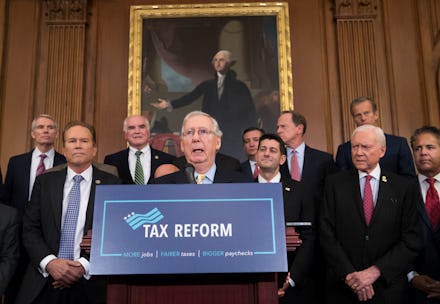3 takeaways from Republicans’ tax plan

Republicans unveiled their long-awaited tax reform bill Thursday, celebrating its release by saying it makes good on their promise to cut taxes for Americans across the board.
However, key GOP lawmakers are already talking about changes they want to see in the bill.
And key interest groups that wield immense power in Washington, D.C., have come out against some of the bill’s provisions, complicating its road to passage.
Any changes made to the bill now will impact the final price tag. And for Republicans, that could ensure it breaks Senate rules that would allow the bill to pass without any Democratic support.
Here are the three biggest takeaways from the GOP tax plan:
There are a ton of political landmines in the bill
Republicans have added some head-scratching provisions to the bill that will make it easily vilified by Democrats and others opposed to the plan.
If the bill passes, filers can no longer itemize their medical expenses in their tax deductions. That could hurt filers that have high health care costs.
The bill would also repeal the student-loan interest deduction, which could turn the millions of Americans who have thousands of dollars in student loans against the plan.
And in another perplexing move, the bill would also nix the tax credit people receive when they adopt children.
All of those changes could make for potent attacks against Republicans, possibly halting momentum for the bill.
Important interest groups are already announcing their opposition
Within minutes of the tax bill’s release, powerful interest groups came out against the legislation.
They include the National Association of Realtors, the National Association of Homebuilders and the National Federation of Independent Business, which said the plan will hurt homebuyers, homeowners and small businesses.
All of these groups spend millions in federal elections — and typically donate more to business-friendly Republicans than Democrats — and could go on the offense against the plan.
For example, the National Association of Realtors spent about $27.5 million on direct contributions and outside spending in the 2016 election, according to OpenSecrets data. The National Association of Homebuilders spent roughly $4.3 million in direct contributions and outside spending in 2016, while the National Federation of Independent Business spent $1.5 million, according to OpenSecrets.
The path to passage is narrow and rife with roadblocks
Republicans have an extremely slim path to passing the bill.
House Republicans from states like New York and New Jersey are coming out against the plan.
That’s because the bill eliminates the state and local tax deduction, known as the SALT deduction. That disproportionately hurts taxpayers in states like New York and New Jersey, which have high state and local taxes. Nixing that deduction could raise taxes on filers in those states.
And the House is the least of Republicans’ worries.
Because the GOP wants to pass the bill without the need to compromise with Democrats, they are relying on a Senate rule that allows the bill to pass that chamber with a simple majority. Since Republicans hold 52 Senate seats, that means they would not need any Democratic support.
But in order to do that, the bill cannot increase the deficit over a 10-year window.
And since any changes to the bill could bust the deficit, that makes tinkering with the legislation to gain support a risky endeavor.
Even if the bill does meet Senate rules allowing for the bill to pass without Democratic votes, three Republican Senators could torpedo the plan.
Republican Sens. Bob Corker of Tennessee, Susan Collins of Maine and Jeff Flake of Arizona have all suggested they could be opposed to the bill.
Collins has said she’s opposed to repealing the Estate Tax — a tax that hits the wealthiest Americans when they inherit money from deceased loved ones. The tax plan Republicans released Thursday phases out that tax.
Corker and Flake, both of whom are retiring and are free from political constraints, have said they would not vote for a plan that doesn’t make strides to cut the deficit.
“Rate reductions have to be accompanied by real reform,” Flake said on the Senate floor Thursday. “We cannot simply rely on rosy economic assumptions, rosy growth rates, to fill in the gap. We’ve got to make tough decisions. We cannot have cuts today that assume that we’ll grow a backbone in the out years.”
Even Sen. Marco Rubio (R-Fla.) suggested he needs to see more from the plan.
“House #TaxReform plan is only starting point,” Rubio tweeted after the bill was dropped. “But $600 #ChildTaxCredit increase doesn’t achieve our & @potus goal of helping working families.”